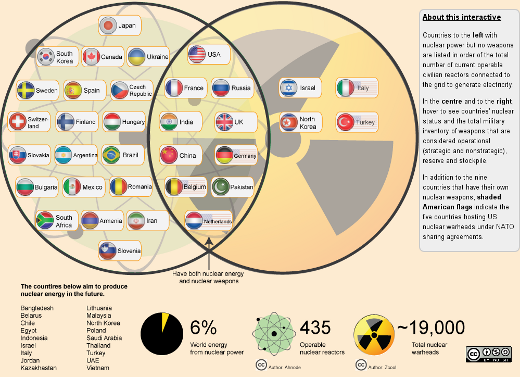“Why is the news hook not the states already with nuclear weapons?” asks Jonathan Granoff, president of the Global Security Institute, which advocates for the elimination of nuclear weapons.
“Why just about the state that might get nuclear weapons? We should focus on countries that have huge arsenals and get rid of them.”
“The main issue is that 189 countries have agreed to pursue a nuclear-free zone in the Middle East,” says Granoff. “Israel doesn’t want it negotiated until it gets security assurances from its neighbours. But the lack of security is in the threat posed by its [own] unsafeguarded nuclear facilities.”
“Iran is a symptom of the failure to have a universal ban on nuclear weapons,” Granoff told Al Jazeera, suggesting that the international community is not approaching the problem correctly by emphasising Iran’s alleged nuclear aspirations.
“Imagine if the Biological Weapons Convention said that no country can have polio or smallpox as weapons, but we’re going to entrust nine countries with the plague! That’s incoherent and unsustainable because we all understand that the plague is not a legitimate weapon due to its indiscriminate and horrific effects.”
“The main issue is that 189 countries have agreed to pursue a nuclear-free zone in the Middle East,” says Granoff. “Israel doesn’t want it negotiated until it gets security assurances from its neighbours. But the lack of security is in the threat posed by its [own] unsafeguarded nuclear facilities.”
“Iran is a symptom of the failure to have a universal ban on nuclear weapons,” Granoff told Al Jazeera, suggesting that the international community is not approaching the problem correctly by emphasising Iran’s alleged nuclear aspirations.
“Imagine if the Biological Weapons Convention said that no country can have polio or smallpox as weapons, but we’re going to entrust nine countries with the plague! That’s incoherent and unsustainable because we all understand that the plague is not a legitimate weapon due to its indiscriminate and horrific effects.”
Granoff adds that “a mere one per cent of the world’s nuclear arsenal could end civilisation”.
“It’s not raining, so close the umbrella,” says Granoff. “The Cold War is over. Let’s get over it.”
“It’s not raining, so close the umbrella,” says Granoff. “The Cold War is over. Let’s get over it.”

Strategic Warheads
Germany, like Japan, is covered by America's Cold War nuclear umbrella. While Japan is said to be able to produce weapons if it needed to, Germany, along with fellow NATO nations Belgium, Netherlands, Italy and Turkey, stores US warheads on its soil.
Although American strategic warheads are stationed within their borders and local troops know how to handle them, these countries cannot actually make sovereign decisions about use or deployment.
The British have in the past considered giving up their nuclear deterrent. Sceptics say the UK does not actually need its warheads for any defensive reasons.
Germany, like Japan, is covered by America's Cold War nuclear umbrella. While Japan is said to be able to produce weapons if it needed to, Germany, along with fellow NATO nations Belgium, Netherlands, Italy and Turkey, stores US warheads on its soil.
Although American strategic warheads are stationed within their borders and local troops know how to handle them, these countries cannot actually make sovereign decisions about use or deployment.
The British have in the past considered giving up their nuclear deterrent. Sceptics say the UK does not actually need its warheads for any defensive reasons.
“They cost an arm and a leg to maintain, and who believes the UK is a superpower at this point?” asks Barth.
Former Cold War enemies Russia and the US have by far the largest number of weapons and are the primary targets of denuclearisation drives. But the most prominent current debate dwells on nascent Iranian capabilities.
Iran has argued its developments are exclusively for civilian purposes and will allow the country to export a larger share of its petroleum resources.
Former Cold War enemies Russia and the US have by far the largest number of weapons and are the primary targets of denuclearisation drives. But the most prominent current debate dwells on nascent Iranian capabilities.
Iran has argued its developments are exclusively for civilian purposes and will allow the country to export a larger share of its petroleum resources.
Via: "Al-Jazeera"




No comments:
Post a Comment